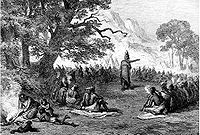Portal:Indigenous peoples of the Americas/Selected article/3

Pontiac's War, Pontiac's Conspiracy, or Pontiac's Rebellion was a war that was launched in 1763 by a loose confederation of elements of Native American tribes primarily from the Great Lakes region, the Illinois Country, and Ohio Country who were dissatisfied with British postwar policies in the Great Lakes region after the British victory in the French and Indian War (1754–1763). Warriors from numerous tribes joined the uprising in an effort to drive British soldiers and settlers out of the region. The war is named after the Ottawa leader Pontiac, the most prominent of many native leaders in the conflict.
The war began in May 1763 when Native Americans, offended by the policies of British General Jeffrey Amherst, attacked a number of British forts and settlements. Eight forts were destroyed, and hundreds of colonists were killed or captured, with many more fleeing the region. Hostilities came to an end after British Army expeditions in 1764 led to peace negotiations over the next two years. Native Americans were unable to drive away the British, but the uprising prompted the British government to modify the policies that had provoked the conflict.
